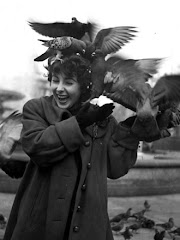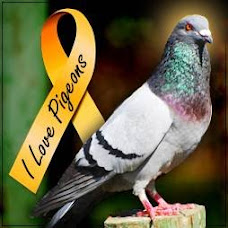November 29, 2007
City Council Member Simcha Felder
4424 16th Avenue
New York 11204
Dear Councilman Felder,
I am one of your Jewish neighbors in Philadelphia, PA, who spends a lot of time in New York. As such, I have heard about your pigeon issues and I would like to respectfully provide my comments.
Surely you are aware that one of the most important tenets of Judaism is kindness to animals, and in fact, the primary principle behind the treatment of animals in Jewish law is preventing the suffering of living creatures - tza'ar ba'alei chayim. I, therefore, find it disturbing and surprising that you have such an intense dislike of a harmless bird to the extent that you have forgotten our teachings and are proposing a rather exorbitant fee ($1,000 ???!) for feeding pigeons and have made numerous derogatory comments about the species.
One of my earliest and fondest childhood memories is of being with my father in Atlantic City, going into the Planters Peanuts shop with him and buying peanuts, which he crushed into small pieces, and feeding the pigeons with him. He entertained me by calling the pigeons by peoples’ names (“Hello Molly”, “How’s the family, Sammy”, etc.). I thought my father the most wondrous of all human beings – why, he actually knew the names of these birds! I learned kindness and respect to animals through my father in this way. While I am not opposed to reasonable consideration on feeding pigeons (people need to be respectful to neighbors and the environment and not create a problem, etc.), I think your fine is excessive and I also think it is rather heavy-handed. Worse, it removes an opportunity for grandparents, parents and children to interact with nature; our children are increasingly removed from the natural world today and are losing the knowledge of how to co-exist with nature. Our solution today to living with a variety of species is to kill them all when they become inconvenient. This is just wrong.
This brings me to my main point. We, of all people, who were treated as something less than human by the Nazis in concentration camps, should NEVER posit a similar opinion about one of God’s creations – that a pigeon deserves contempt while a robin, for instance, is okay. Does this not make us exactly like the people who tried to exterminate us? Your comments regarding foie gras and your insensitivity to the intense suffering of ducks and geese were equally unkind. Kindness and mercy are among the defining traits of the Jewish people and we are taught that anyone who shows kindness to animals demonstrates that he is descended from Abraham. Your actions and statements are contrary to this.
I think you need to do some little research about pigeons (and, for that matter, foie gras). They have never caused any disease (despite the best efforts of researchers to pin something on them, no proof has ever been found; they are no dirtier than any other wild bird; in fact, they do not get bird flu), they are exemplary parents, they are benign, harmless, rather friendly, never bite; expert navigators, they have saved countless lives in World Wars I and II, serving as message carriers (read up on a French pigeon named “Cher Ami”) and they are part of the dove family. Where would Noah have been without them? What is a city without pigeons? I cannot even imagine St. Marks Square or New York without these urban symbols.
If you want to blame filth and dirt problems somewhere, try humans. It is our species that creates garbage, disease and unsanitary conditions and is destroying this planet, not the pigeons. I have seen people miserable enough to deliberately run pigeons over with their cars and poison them. You tell me which species is better.
In the Bible, those who care for animals are heroes, while those who hunt animals are villains. Jacob, Moses and King David were all shepherds, people who cared for animals (Gen. 30, Ex. 31, I Sam. 17). The Talmud specifically states that Moses was chosen for his mission because of his skill in caring for animals. "The Holy One, Blessed Be He, said 'Since you are merciful to the flock of a human being, you shall be the shepherd of My flock, Israel.'" Likewise, Rebecca was chosen as a wife for Isaac because of her kindness to animals. When Abraham's servant asked for water for himself, she volunteered to water his camels as well, and thereby proved herself a worthy wife (Gen. 24).
On the other hand, the two hunters in the Bible, Nimrod and Esau, are both depicted as villains. The Talmud tells the story of a great rabbi, Judah Ha-Nasi, who was punished with years of pain because he was insensitive to the fear of a calf being led to slaughter.
I sincerely hope that you will open your mind and re-think the pigeon situation. Perhaps more importantly, re-think your attitude toward ALL animals and remember that we are the Chosen People because we are the role models for the world. As such, we must demonstrate a higher ethic, the highest of which is kindness and compassion to all living things.
Very truly yours,
Arlene B. Steinberg
Philadelphia, PA 19115
____________________________________
The Talmud tells us that the great sage, Rabbi Yehuda HaNasi, the compiler of the Mishna (the basic framework of the Talmud), was punished for an incident here he was insufficiently caring for an animal, and he was only relieved from his punishment when he showed mercy on some kittens.
There is a story told in the book Charedim by Rabbi Elazar Ezkari (d. 1600) About the Arizal - Rabbi Yitzchak Ashkenazi--the famous mystic of Tzefas, Israel--who was a contemporary of Rabbi Ezkari (who also lived in Tzefas). The Arizal once looked at the face of a certain Torah scholar and told him, "Your face is marked by the sin of causing pain to animals." The scholar was very disturbed. He investigated the matter and discovered that his wife did not feed their chickens in the morning but instead allowed them to wander through the yard and street to peck for food. He instructed his wife to prepare for them a mixture of bran-flour and water every morning. Shortly after he had done this he met the Arizal again and the Arizal informed him, without knowing about what he had done, that the sin was gone.
Subscribe to:
Post Comments (Atom)












No comments:
Post a Comment